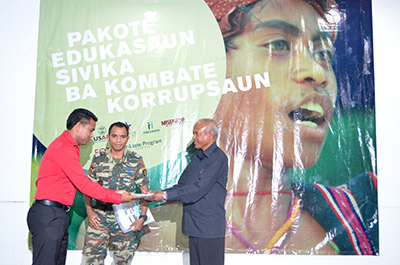Timor-Leste: Using civic education to combat corruption

Recently, Interpeace partner in Timor-Leste, the Centre of Studies for Peace and Development (CEPAD) together with FOTI Timor-Leste Programme kicked off another stage of the anti-corruption initiative. The USAID/MCC-funded FOTI Timor-Leste Program seeks to aid corruption fighting institutions by enhancing the watchdog capacity and public advocacy of non-state actors, such as Interpeace's partner CEPAD. FOTI is able to strengthen the anticorruption network by helping institutions to deter, detect, and sanction corruption. Together, CEPAD and FOTI have signed a memorandum of understanding pledging to work to implement citizen-driven initiatives to promote good governance, accountability, and transparency within the country.
In 2007-2009, over 1,000 Timorese citizens identified combating corruption, collusion and nepotism (KKN) as one of four main priorities in building a more peaceful Timor-Leste. CEPAD and FOTI Timor-Leste agreed that education is the one key to achieving this community-set goal. In a civic education campaign aimed at bolstering peacebuilding and productivity throughout the country, the partners co-commissioned and compiled a set of anti-corruption learning materials that celebrated their first release at the end of last month.
Building beyond corruption
Of the many challenges in eliminating corruption in Timorese society, one of the most difficult to surmount - and indeed the most crucial to accomplish - is deciding where to begin. And, for the two-year mapping period, Interpeace partner CEPAD devoted itself to just that. The result was a well-designed selection of civic education materials, ranging through different forms of media - a children's story book, a CD album, a television programme, a documentary film, and a KKN brochure. Each facet of the campaign is centred around the repercussions of corruption and ways to eradicate it, although each features different Timorese voices and targets different audiences throughout the country. The wide range of materials reflects one of the project's goals: distribute the package throughout the 12 remaining districts of Timor-Leste within the first year of the project.
Supporting a campaign for stability and peace
At the launch in Dili, a group of over 60 attendees and speakers discussed the role of these educational packages in the ongoing journey toward peace and stability in Timor-Leste. João Boavida, the Executive Director of CEPAD, claims that "the lack of public information on the basic concept of corruption" is a gaping hole in the process toward eliminating it. The development and distribution of this civic education package will hopefully "contribute to raising citizen's awareness of corruption and anti-corruption measures," he said in relation to the launch of the package.
Marçal Avelino Ximines, Vice-Minister for Higher Education and Science in Timor-Leste, shared Boavida's passion, announcing at the launch, "We wish to build for the children of our nation, a strong society - developed, fair, free of corruption, and focused on the values, traditions, history, and culture inherent in our people." He called the fight against corruption a "global concern [that] violates fundamental ethical principles," and goaded people everywhere to combat it with education and active citizenship.
Looking ahead
The September launch was a good start to what has already become a national movement to end corruption in Timor-Leste. The large media presence at the launch in conjunction with the comprehensive civic education campaign provide the Timor-Leste anti-corruption initiative with a strong foundation for a journey toward peace and stability.
